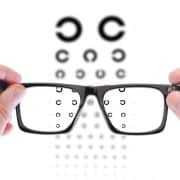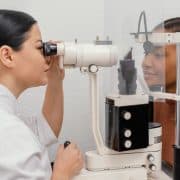Contact Lenses vs. Glasses: Which Is Right for Your Lifestyle?
Your optometrist in Elkridge, MD can give you a prescription for eyeglasses, contact lenses or both. In the vast majority of cases, it’s up to you to decide which you want to wear most of the time. Of course, some people choose to get both contact lenses and glasses, while others prefer using glasses exclusively to correct their vision. If you’re new to corrective eyewear, you’ve got a decision to make!
What About Glasses?
By all accounts, glasses are easy to use and require less maintenance. They’re ideal for people who want a simple, no-fuss solution for vision correction. Glasses also reduce the risk of eye infections and can offer added protection from wind, dust, and debris. For those who spend long hours in front of screens, blue light filtering lenses can help ease eye strain. However, they may be less practical during physical activities or in wet weather. Glasses were the standard in corrective eyewear for many, many years, and they remain a popular choice, despite their drawbacks. Also, if you enjoy sports like snorkeling, skiing, swimming and more, you can get prescription lenses for your specialty goggles, so you really never have to wear contact lenses if you don’t want to.
What About Contact Lenses?
Contact lenses, on the other hand, offer a full field of vision with no frames blocking your view. They’re a great choice for athletes or anyone with an active lifestyle. Contacts won’t fog up in the cold or slip during exercise. They also allow more flexibility with fashion, since you can wear any type of sunglasses or go without visible eyewear. That said, most contact lenses require daily cleaning—with the exception of daily disposables—and technically can increase the risk of irritation or infection if not handled properly, although that is rare if you practice safe contact lens handling and cleaning.
At the end of the day, your decision might come down to personal preference—or a combination of both. Both glasses and contact lenses in Elkridge, MD are effective solutions—it’s just a matter of choosing what makes you feel most comfortable, confident, and supported in your day-to-day life.





